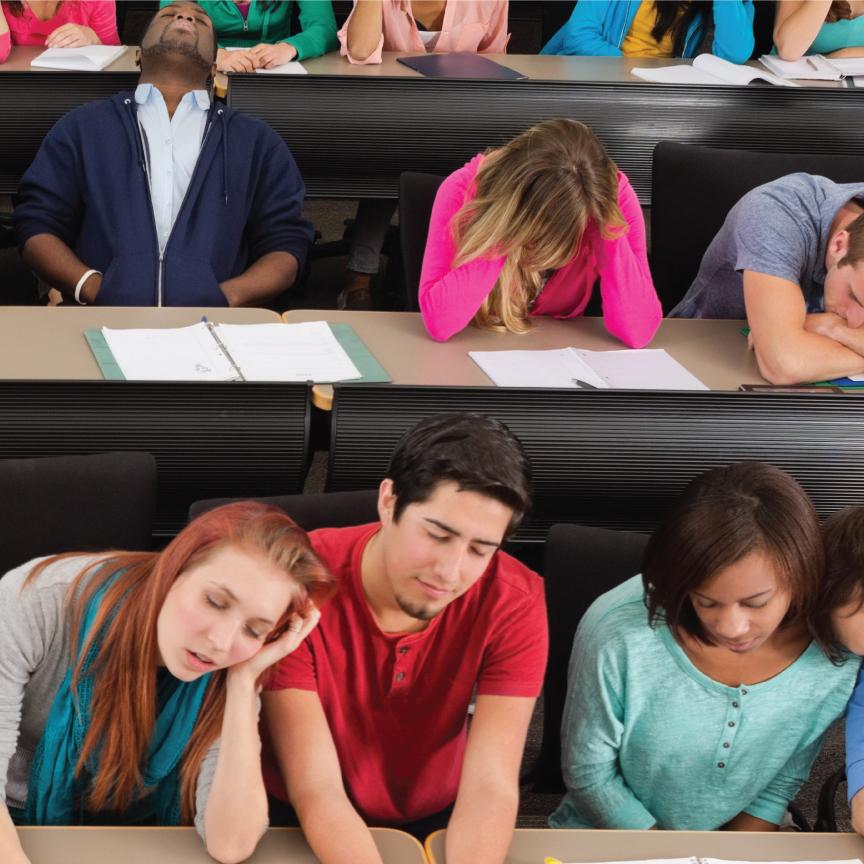Sleep is a strong predictor of academic success in college, yet sleep problems are common and may be difficult for students.
In the 2018 U-M National College Health Assessment:
- 21% of undergraduates had sleep difficulties that affected their academic performance
- 28% of undergraduates had sleep difficulties that were traumatic or very difficult to handle
- Females were more affected than males
Many students build self-management skills for sleep during their undergraduate years. When faced with tricky problems, some students develop clever solutions, which are also known as hacks. Sleep hacks are just helpful approaches when one is struggling with sleep or wants to develop better sleep habits.
Tricky problem: So much to do, so little time. Students may prioritize studying or socializing at night instead of sleeping.
Hacks:
- If night sleep is short, experts recommend taking a brief nap (up to 45 minutes) during the day to help refresh body and mind.
- For students, choosing a location that says "nap" instead of "sleep" can help, so they may put their head down on a desk or stretch out on the floor instead of retreating to their bed, under cozy covers in a dark room.
- Most students avoid all-nighters (staying up all night) because they take a toll, but if it happens, students may take brief naps or go to sleep early the next night to avoid throwing off their entire sleep schedule.
Tricky problem: FOMO (fear of missing out). Students may want to keep up with friends on social media or the 24-hour news cycle instead of sleeping at night. The problem is that night-time electronics absorb time like a sponge and expose students to blue light that disrupts their circadian rhythm (the wake/sleep cycle), making it harder to fall asleep.
Hacks:
- Experts recommend putting electronics aside at least 30 minutes before bed.
- Some students put the phone in an inconvenient place before bed: under the mattress, across the room, or in another room and use a separate alarm to wake up.
- If they can’t turn off the tech, students often dim the screen or use the "night shift" mode, put the device on silent or use the “Do not disturb” option.
Tricky problem: Schedules vary. This is tricky because erratic wake times play havoc with students’ circadian rhythm.
Hacks:
- Experts recommend waking up about the same time every day, even on weekends. But sleeping in feels so good!
- Students often strike a happy medium, e.g. sleeping in a bit later on weekends without significantly impacting night-time sleep. And most students do not want to waste their weekend by sleeping it away.
- Students also do their best to choose a class schedule that allows a preferred wake-up time, and find ways to minimize night-time disruptions from roommates.
Tricky problem: How to quiet an active mind in order to fall asleep.
Hacks:
- Experts recommend developing a bedtime routine to let go of daily to-dos.
- Some students watch light-hearted videos. They may light a flameless candle, which provides soft light and is safe even if they fall asleep. Others write or draw in a journal, read for pleasure, reflect on the day and what they’re grateful for or listen to music or a guided mindfulness meditation.
- This intentional power-down can help students shift into a more relaxed state that is conducive to sleep.
You may want to talk with your student about how sleep is going, what works for them and any struggles.
And if your student struggles, maybe sleeping too little or too much, you could suggest that they look into recommendations and university resources for Sleep on the University Health Service website.
To help Student Life continue making a difference in students' lives, please consider making a gift.

